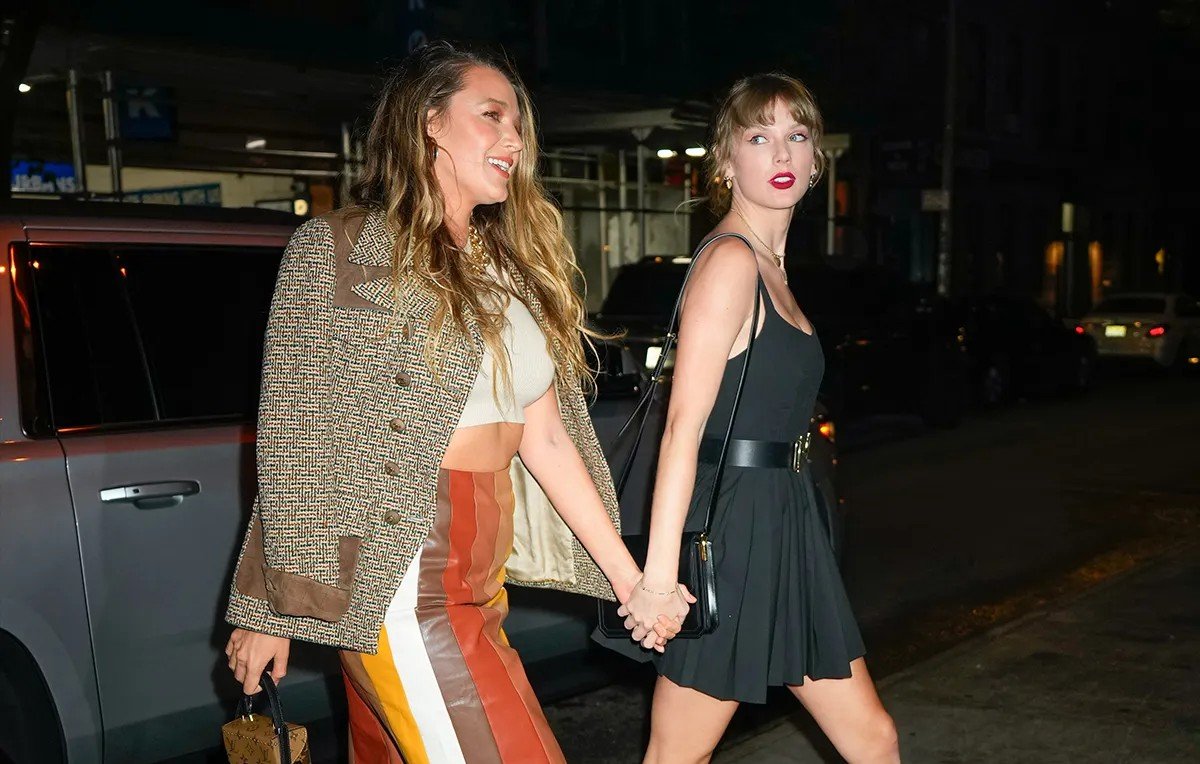When two of Hollywood’s most beloved stars collide, the world takes notice. Taylor Swift and Blake Lively, once inseparable friends and godmothers to each other’s lives, are now at the center of a brewing storm that’s equal parts drama, betrayal, and Game of Thrones-level intrigue. What started as a creative disagreement over a movie scene has spiraled into a full-blown feud, complete with accusations of manipulation, name-dropping, and even a bizarre “dragon” analogy. Here’s the inside story of what went wrong—and what it means for their future.
The Meeting That Started It All
The drama began at Blake Lively and Ryan Reynolds’ luxurious New York City penthouse. Justin Baldoni, the director of It Ends with Us—the highly anticipated film adaptation of Colleen Hoover’s bestseller—arrived to discuss a scene Blake had rewritten. What was meant to be a routine creative meeting quickly turned into a heated confrontation. Baldoni later described feeling “ambushed” when Ryan Reynolds and Taylor Swift unexpectedly joined the discussion, escalating tensions.
But according to sources close to Taylor, she had no idea Baldoni would be there. “She arrived at the time Blake told her to,” an insider revealed. “Taylor walked in as Justin was about to leave. They exchanged brief pleasantries—she mentioned being excited for the film—and that was it.” The problem? Swift believes Blake intentionally timed her arrival to coincide with Baldoni’s exit, using her presence to intimidate him.
The “Dragon” Comment That Lit the Fuse
The real turning point came after the meeting. Blake allegedly texted Baldoni, comparing herself to Game of Thrones’ Khaleesi (Daenerys Targaryen) and referring to Taylor and Ryan as her “protective dragons.” To Swift, the analogy wasn’t just quirky—it was deeply offensive. “It’s weird to say that about a friend,” a source close to Taylor shared. “Taylor isn’t a sidekick. She’s nobody’s pawn.”
The “dragon” label struck a nerve, symbolizing what Swift perceives as Blake’s exploitation of their friendship for clout. It wasn’t just a casual comment—it was a metaphor that exposed a power dynamic Swift wasn’t comfortable with.
Allegations of Name-Dropping and Broken Trust
The fallout didn’t stop there. Swift reportedly discovered that Blake had been leveraging her name without consent. One particularly troubling allegation claims Blake told a young actress that Taylor “cast her” in a project—a statement Swift’s team vehemently denies. “Taylor had no involvement,” the source emphasized. “This wasn’t just a misunderstanding. It was a breach of trust.”
The tension even spilled into legal territory. On TMZ’s podcast Two Angry Men, host Harvey Levin questioned Justin Baldoni’s lawyer, Bryan Freedman, about subpoenaing Swift for a deposition. While no formal action followed, the exchange hinted at the stakes: Taylor’s team insists she was unwittingly dragged into a battle not her own.
Can This Friendship Be Saved?
Despite the rift, insiders close to Blake insist the friendship isn’t beyond repair. “They still talk regularly,” one source claimed, adding that Blake apologized for the “dragons” remark. “They hugged it out and had a good cry.”
But Swift’s camp tells a different story. While acknowledging the apology, they stress lingering resentment over Blake’s “calculated” behavior. The conflict is especially delicate given Swift’s role as godmother to one of Blake and Ryan’s children—a bond that once symbolized their sister-like closeness.
Why This Feud Matters
This isn’t just another celebrity spat. It’s a case study in the complexities of power, loyalty, and trust in Hollywood. The friction between Blake’s rewritten scene and Baldoni’s resistance highlights the challenges of creative control in film adaptations. Meanwhile, the allegations of name-dropping underscore the delicate balance of influence and integrity in celebrity friendships.
At its core, this feud raises a bigger question: Can a private apology heal a friendship when reputations and careers are on the line? For Taylor Swift, the answer seems to hinge on whether Blake can rebuild the trust that’s been broken.

 "/>
"/> "/>
"/>